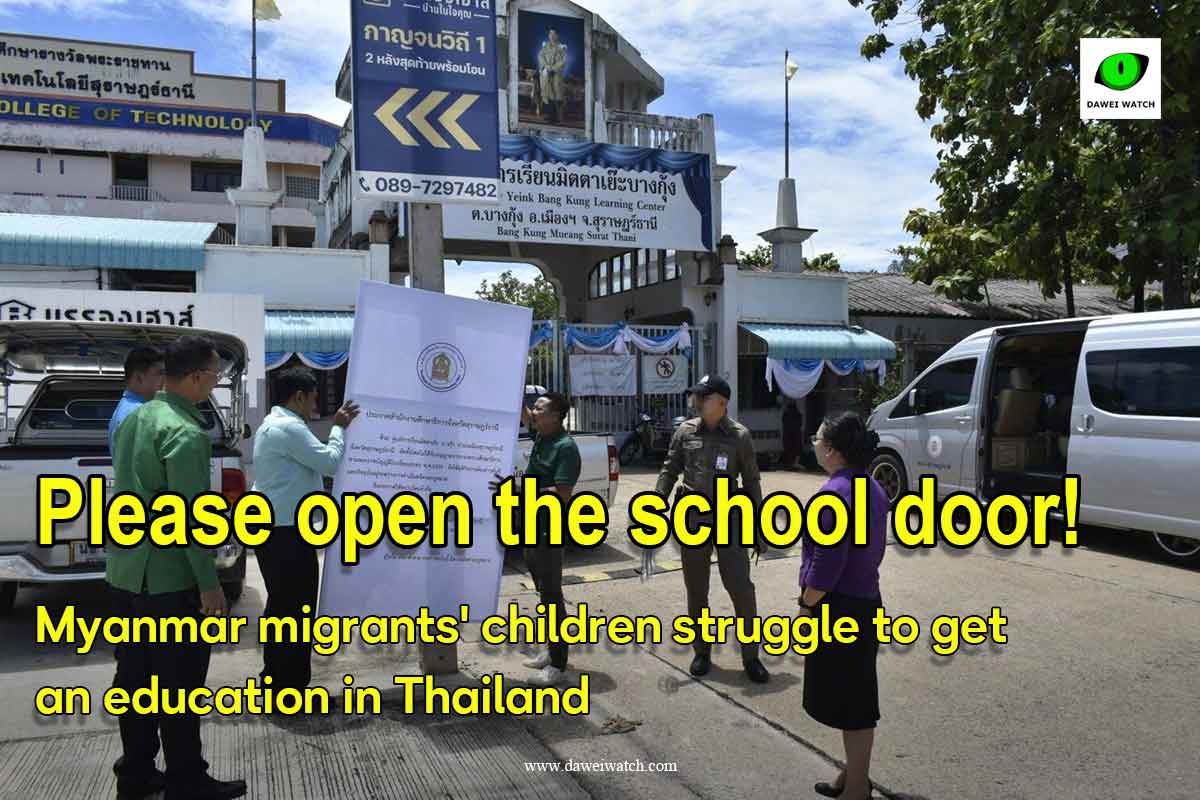Myanmar migrants’ children struggle to get an education in Thailand
A young child from Myanmar used to sit in front of his house with his dog while he waited for his bus to school in Thailand every day. On school days, neighbours would often see him running to catch the school bus, wearing his blue and white school uniform.
Now, however, his days of learning in school and getting an education are over.
Although Lu Lay (not his real name) would sometimes look sleepy while he waited for his bus to school with his father, he would quickly spring into action and run to the bus as soon as he saw it – he didn’t want to miss out on a day at school.
Lu Lay had been attending school on Koh Samui in Thailand after his family migrated from Myanmar to the Thai island that is popular with foreign tourists. But now he has lost his right to learn because his school has been closed.
Since the end of 2024, Myanmar schools in southern Thailand have been closed one after another, and the school Lu Lay was attending was one of them.
“I want to go to school if I can. I also want to play with my friends. Now, I’m learning to read alone at home,” said Lu Lay.
A statement released by a research group at Mahidol University in Thailand stated that the number of migrant children in Thailand, including those from Myanmar, numbered between 400,000 and 500,000.
Sixty-one percent of these children cannot go to school in Thailand. Thirty-four percent of the children were attending Thai schools, and 5% were attending migrant schools, according to the statement.
Losing the basic right to learn
Thai law and government policy says all children, no matter their citizenship, have the right to an education in Thailand. However, school doors are still closed to Myanmar migrant children like Lu Lay.
A Myanmar school was opened on Koh Samui in southern Thailand, where Lu Lay lives, in May 2024. But on September 4, 2024, four months after the school was opened, the Thai government closed six Myanmar schools, including the Koh Samui school in Surat Thani district, southern Thailand. As a result, nearly 2,000 Myanmar children lost their right to learn and get an education.
The reasons given for closing the schools were they were opened without permission, and the teachers were working illegally in Thailand and teaching the Myanmar curriculum at these schools, according to the Township Education Officer in Surat Thani province, where Lu Lay’s school was.
After the first closures, three more Myanmar schools on Koh Samui and nearby Koh Pha Ngan were also shut down and more than 500 Myanmar children on the islands lost their right to get an education.
Lu Lay has been waiting for his Myanmar school to reopen, his father U Lu Phay said.
“My son is young. He is only nine years old. Since he is of school age, he keeps asking me when his school will be reopened. We could not give him an answer,” U Lu Phay said.
The Thai government has a responsibility to ensure there are learning opportunities for Myanmar children who cannot go to school, according to the United Nations Convention on the Rights of the Child (CRC), the Thai human rights commission (NHRCT) announced.
Furthermore, according to a report on The Nation Thailand news website, the 1999 Education for All Policy and the 2005 Cabinet Resolution on Education for Unregistered Persons decreed that all non-Thai children are entitled to enjoy a free basic education in Thai public schools.
The story stated that the Thai government was violating the CRC by shutting down Myanmar schools in the country. However, there is still no chance for Lu Lay to go to school, and he has now been out of school for almost one year.
A birth certificate is vital
Since many Myanmar schools were closed, some children of immigrants tried to attend Thai schools.
One of the difficulties in getting Myanmar children registered at Thai schools is that a certified Thai birth certificate is required. Most young children from Myanmar who fled with their parents after the coup do not have Thai birth certificates.
To obtain birth certificates for Myanmar children born at Thai hospitals, applications must be sent to respective township offices with official documents from both parents and recommendations from their employer.
A Thai birth certificate was not obtained for Lu Lay, although he was born in Thailand, because his mother did not have official documents at the time.
“At the time he was born, my wife didn’t have the pink card. So, my son didn’t have a birth certificate. That’s why we couldn’t get my son registered at a Thai school,” said U Lu Phay.
A Thai birth certificate is an important document for Myanmar children and it is a crucial document to help the children get enrolled in schools and to get a health insurance card for them.
To get children with Myanmar parents enrolled at most schools on Koh Samui and Koh Pha Ngan islands, both parents must be living in Thailand officially and the child must have a Thai birth certificate.
However, there are still children who cannot get enrolled at schools on the islands, even though they have all the documents, because only a few schools exist there and a limited number of students are accepted.
Trying to get children educated
Thai authorities announced that migrant children could enroll at other Thai schools after their schools in Surat Thani province were shut down, according to the Foundation of Education and Development (FED).
However, most of the Thai schools in the area accept only a few Myanmar children without Thai birth certificates, Min Oo, Worker In-charge of FED based in southern Thailand, pointed out.
“It is difficult for every (Thai) school to accept children immediately and to accept children who do not know the Thai language,” said Min Oo.
Myanmar children without birth certificates could enroll at Thai schools with the recommendation of an employer or the authorities in their neighborhood, said Min Oo.
The child must have a basic understanding of the Thai language, and the parents must be able to communicate with neighbourhood authorities. If the parents have the necessary official documents and the employer can spare some time, children could enroll at Thai schools.
However, language difficulties for the parents and an employer’s lack of care for his employees and not giving his time could make the enrollment of children difficult, Min Oo explained.
“Many Myanmar parents cannot explain the situation properly to their employers because they do not speak Thai very well. And the necessary documents the schools ask for cannot be obtained because the employer does not help them. So, the children cannot go to school,” said Min Oo.
Some Thai employers have been accused of exploiting their workers and ignoring the education of the workers’ children and other rights. U Lu Phay, Lu Lay’s father, talked to his employer about his son not getting enrolled at school, but the employer did not care.
“Many employers don’t care enough to help a child get enrolled at school. They just want our labour,” said U Lu Phay. “For some employers, enrolling a child at school is out of the question because they are not interested, even when we are sick. They don’t want to have any headaches.”
Children who have lost the right to get a basic education have little chance of getting a well-paid job and face job instability in the future, said Mon (not her real name), who has been doing research on children’s education.
Mon is a female CDM lecturer from the Institute of Education. She has been creating education opportunities for the children who have been forced to drop out of school.
UNESCO announced in 2021 that 171 million children worldwide had not finished a middle-school education, were extremely poor and most were in a vicious circle of poverty because they did not know how to write, read or do mathematics, Mon pointed out.
The same announcement also stated that the world’s poverty rate could be alleviated by more than half if all children completed a basic education. According to a World Vision announcement in 2020, the world having up to 160 million child labourers is one of the negative impacts of children not being able to go to school, said Mon.
Myanmar citizens who have been in Thailand for various reasons are struggling to continue their children’s education amid many difficulties, and the children of Myanmar migrant workers face more difficulties in continuing their education.
Since his desire is to see Lu Lay get a good education, he would continue his efforts so his son could go to school, said U Lu Phay.
“I don’t want him to work doing hard labour, like a slave in another country. It’s every parent’s wish to see his child as an educated person and to be well off in their life. I want him to be able to stand on his own, relying on his own expertise, one day.”
Dawei Watch
—– ENDS —-







